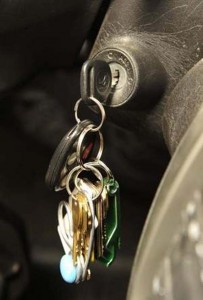General Motors has turned to NASA to help determine whether it is safe for owners to continue driving the 2.6 million vehicles it has recalled due to an ignition switch defect.
That’s a critical question as GM awaits a ruling by a federal judge in Texas who could force the maker to ground all of the vehicles sold in the U.S. and provide temporary loaners to inconvenienced owners. GM began recalling an assortment of compact models in mid-February, expanding it in several steps since then because of a shared ignition switch has been linked to 31 crashes and 13 deaths.
This would not be the first time the space agency got involved in an automotive safety problem. At the behest of the National Highway Traffic Safety Administration, NASA previously handled an investigation of alleged defects with millions of Toyota vehicles – ultimately finding no problem with the cars’ electronic control systems.
Ralph R. Roe Jr., the director of the NASA Engineering & Safety Center, is expected to lead the GM inquiry, a source told TheDetroitBureau.com, confirming an earlier report in the Detroit News.
GM has come under intense fire over the last two months due to the ignition switch problem. Under certain circumstances it can move from the On to Off or Accessory position, shutting the car’s engine off, disabling the power brakes and steering and airbag systems.
Internal GM documents show the maker learned about the potential problem as early as 2001 and repeatedly failed to act, a senior engineer ruling the costs did not previously justify ordering a recall. For the 2008 model-year, GM quietly updated the switches, again without ordering a recall of older vehicles.
(GM facing $7,000/day fine for delaying response on ignition switch recall. Click Here for the story.)
The maker has offered owners the chance to park their vehicles and get a temporary loaner until repairs are made, something thousands have taken the company up on. But during testimony before Congress earlier this month, GM CEO Mary Barra insisted the cars can still be driven safely. The maker has told owners to remove everything else from their keyrings but the actual ignition key.
That claim has been disputed by several safety advocates and plaintiffs’ attorneys, one of which has brought the issue to federal court in Corpus Christi, Texas. The judge there has not yet ruled on whether to order GM to have all of the recalled vehicles grounded until repairs are made.
GM this week began advising owners to schedule service with their local dealers, but as parts are only expected to roll in slowly, the full repair process could take months, according to industry experts.
The Detroit maker has declined to comment on the reports of NASA’s involvement in the defect dispute and NHTSA officials were not available for a response, either. GM spokesman Greg Martin did tell the News, “I will say what we have in the past, that we will draw upon an array of outside expertise to help guide us during this time.”
GM CEO Barra was barraged with questions during her appearance on Capitol Hill, but offered relatively few specific answers about the recall and the years of delays. Meanwhile, a potential criminal investigation is ramping up at the Justice Department.
A senior official involved in GM’s handling of the recall response told TheDetroitBureau.com that the company is cooperating fully with the Justice Dept., describing its investigators as “professional,” and not politically motivated. He also indicated GM expects the process of working through the issue to take perhaps several years.
The maker has been closely studying how Toyota handled a similarly explosive problem with a delayed recall for so-called unintended acceleration, something that led to its agreement last month to pay a $1.2 billion fine and accept three years of probation. Many industry observers anticipate that will serve as a model for the eventual conclusion of the Justice Dept.’s GM probe.
(GM investing nearly $500 million to prepare for next Chevy Volt plug-in launch. Click Here for more.)

